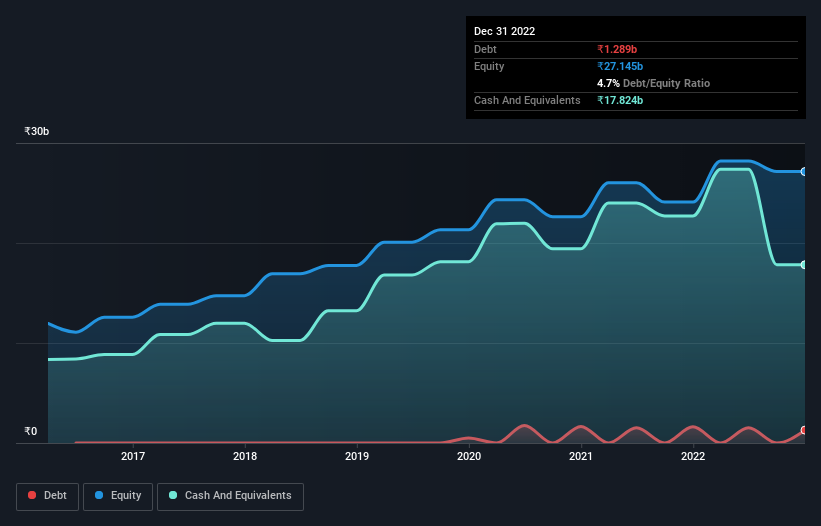
Warren Buffett famously said, 'Volatility is far from synonymous with risk.' When we think about how risky a company is, we always like to look at its use of debt, since debt overload can lead to ruin. We note that Abbott India Limited (NSE:ABBOTINDIA) does have debt on its balance sheet. But the more important question is: how much risk is that debt creating?
What Risk Does Debt Bring?
Debt is a tool to help businesses grow, but if a business is incapable of paying off its lenders, then it exists at their mercy. Part and parcel of capitalism is the process of 'creative destruction' where failed businesses are mercilessly liquidated by their bankers. While that is not too common, we often do see indebted companies permanently diluting shareholders because lenders force them to raise capital at a distressed price. Of course, the upside of debt is that it often represents cheap capital, especially when it replaces dilution in a company with the ability to reinvest at high rates of return. When we think about a company's use of debt, we first look at cash and debt together.
See our latest analysis for Abbott India
How Much Debt Does Abbott India Carry?
The image below, which you can click on for greater detail, shows that Abbott India had debt of ₹1.29b at the end of September 2022, a reduction from ₹1.61b over a year. However, its balance sheet shows it holds ₹17.8b in cash, so it actually has ₹16.5b net cash.

A Look At Abbott India's Liabilities
We can see from the most recent balance sheet that Abbott India had liabilities of ₹12.0b falling due within a year, and liabilities of ₹1.85b due beyond that. Offsetting these obligations, it had cash of ₹17.8b as well as receivables valued at ₹3.34b due within 12 months. So it can boast ₹7.30b more liquid assets than total liabilities.
Having regard to Abbott India's size, it seems that its liquid assets are well balanced with its total liabilities. So while it's hard to imagine that the ₹428.2b company is struggling for cash, we still think it's worth monitoring its balance sheet. Succinctly put, Abbott India boasts net cash, so it's fair to say it does not have a heavy debt load!
Another good sign is that Abbott India has been able to increase its EBIT by 23% in twelve months, making it easier to pay down debt. There's no doubt that we learn most about debt from the balance sheet. But it is Abbott India's earnings that will influence how the balance sheet holds up in the future. So when considering debt, it's definitely worth looking at the earnings trend. Click here for an interactive snapshot.
Finally, a company can only pay off debt with cold hard cash, not accounting profits. Abbott India may have net cash on the balance sheet, but it is still interesting to look at how well the business converts its earnings before interest and tax (EBIT) to free cash flow, because that will influence both its need for, and its capacity to manage debt. Over the last three years, Abbott India recorded free cash flow worth a fulsome 82% of its EBIT, which is stronger than we'd usually expect. That positions it well to pay down debt if desirable to do so.
Summing Up
While it is always sensible to investigate a company's debt, in this case Abbott India has ₹16.5b in net cash and a decent-looking balance sheet. And it impressed us with free cash flow of ₹8.2b, being 82% of its EBIT. So is Abbott India's debt a risk? It doesn't seem so to us. Above most other metrics, we think its important to track how fast earnings per share is growing, if at all. If you've also come to that realization, you're in luck, because today you can view this interactive graph of Abbott India's earnings per share history for free.
At the end of the day, it's often better to focus on companies that are free from net debt. You can access our special list of such companies (all with a track record of profit growth). It's free.
New: Manage All Your Stock Portfolios in One Place
We've created the ultimate portfolio companion for stock investors, and it's free.
• Connect an unlimited number of Portfolios and see your total in one currency
• Be alerted to new Warning Signs or Risks via email or mobile
• Track the Fair Value of your stocks
Have feedback on this article? Concerned about the content? Get in touch with us directly. Alternatively, email editorial-team (at) simplywallst.com.
This article by Simply Wall St is general in nature. We provide commentary based on historical data and analyst forecasts only using an unbiased methodology and our articles are not intended to be financial advice. It does not constitute a recommendation to buy or sell any stock, and does not take account of your objectives, or your financial situation. We aim to bring you long-term focused analysis driven by fundamental data. Note that our analysis may not factor in the latest price-sensitive company announcements or qualitative material. Simply Wall St has no position in any stocks mentioned.
About NSEI:ABBOTINDIA
Flawless balance sheet with solid track record and pays a dividend.

